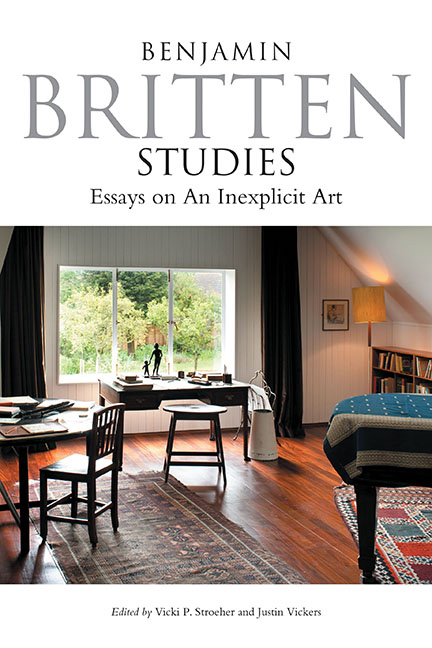Book contents
- Frontmatter
- Dedication
- Epigraph
- Contents
- List of Illustrations
- List of Musical Examples
- List of Tables
- Notes on Contributors
- Acknowledgements
- Bibliographic and General Abbreviations
- Editors’ Preface
- Introduction: Writing About Britten
- Part I Identity: Exile and Return
- 1 The Shock of Exile: Britten and the American Years
- 2 Britten, Paul Bunyan, and “American-ness”
- 3 Collaborating with Corwin, CBS, and the BBC: Britten's Re-entry into British Radio in 1942
- 4 An Empire Built on Shingle: Britten, the English Opera Group, and the Aldeburgh Festival
- Part II Britten and Intimacy
- Part III Britten and His Craft
- Part IV Britten and Matters of Practicality
- Conclusion and Epilogue
- Works Cited
- Index
1 - The Shock of Exile: Britten and the American Years
from Part I - Identity: Exile and Return
Published online by Cambridge University Press: 25 October 2017
- Frontmatter
- Dedication
- Epigraph
- Contents
- List of Illustrations
- List of Musical Examples
- List of Tables
- Notes on Contributors
- Acknowledgements
- Bibliographic and General Abbreviations
- Editors’ Preface
- Introduction: Writing About Britten
- Part I Identity: Exile and Return
- 1 The Shock of Exile: Britten and the American Years
- 2 Britten, Paul Bunyan, and “American-ness”
- 3 Collaborating with Corwin, CBS, and the BBC: Britten's Re-entry into British Radio in 1942
- 4 An Empire Built on Shingle: Britten, the English Opera Group, and the Aldeburgh Festival
- Part II Britten and Intimacy
- Part III Britten and His Craft
- Part IV Britten and Matters of Practicality
- Conclusion and Epilogue
- Works Cited
- Index
Summary
In 1971 artist Milein Cosman made a quick sketch of her husband, music critic Hans Keller. It is a mass of implicit contradictions. Keller emerges as though straight from an Egon Schiele sitting: there is so much detail and expression caught in so few lines. In life Keller always gave the outward impression that he would have been completely at home with the vivid characters populating the canvases and sketchbooks of Viennese modernist Schiele: the reclining women, their legs wide apart, their labia showing; the nude men barely covered by loincloths; the garish self-portraits and scowling masturbators. Cosman revealed this version of Keller: his hair is wild, barely distinguishable from the background; his nose is in a book or score; his eyebrows high, his Groucho Marx moustache unmistakable. This image is that of the author of “Schoenberg and the Men of the Press” (1950–51); or articles on Stravinsky or Moses und Aron, Freud or psychopathology; or the wounded psychology of contemporary critics: a clear-sighted modernist taking a scythe to foggy English critical thought.
His pedigree demanded it, after all: a Jew in Austria after the Anschluss, he made good his precarious escape to London in 1938 aged nineteen, bringing with him an intellectual and musical heritage he never quite shook. Nor did he want to shake it: no matter how integrated he became, he held on to these formative years and traditions as a cultural map, ever more firmly as events overtook him and his memories morphed, one into the other. In this regard he was a little like the aunts of historian Tony Judt, who had also escaped Hitler and who put the young Judt in his place by politely enquiring of him whether he had read one German classic or another. “Their sense of loss was palpable,” Judt later wrote, “and omnipresent: the German world that had abandoned them was the only one they knew and the only one worth having – its absence was a source of far greater pain than anything that the Nazis had perpetrated.” Theirs was a more polite, nuanced version of the sense of loss expressed by a different émigré, the art critic Alfred Polgar, unhappily holed up in California during the war but determined to live just long enough to “enjoy the end of the awful mess made by that monstrous arsehole” Hitler.
- Type
- Chapter
- Information
- Benjamin Britten Studies: Essays on An Inexplicit Art , pp. 18 - 32Publisher: Boydell & BrewerPrint publication year: 2017

